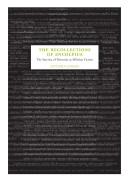| Listing 1 - 4 of 4 |
Sort by
|

ISBN: 9080739081 9491431374 Year: 2004 Volume: 2 Publisher: Groningen Barkhuis Publishing ; University Library
Abstract | Keywords | Export | Availability | Bookmark
 Loading...
Loading...Choose an application
- Reference Manager
- EndNote
- RefWorks (Direct export to RefWorks)
While nineteenth-century scholars debated whether the fragmentary Satyrica of Petronius should be regarded as a traditional or an original work in ancient literary history, twentieth-century Petronian scholarship tended to take for granted that the author was a unique innovator and his work a synthetic composition with respect to genre. The consequence of this was an excessive emphasis on authorial intention as well as a focus on parts of the text taken out of the larger context, which has increased the already severe state of fragmentation in which today's reader finds the Satyrica.The presen
Fiction, Ancient --- Satire, Latin --- History and criticism. --- Petronius Arbiter. --- Maderna, Bruno. --- History and criticism --- Petronius Arbiter --- Satire [Latin ] --- Fiction [Ancient ]
Book

ISBN: 9783110638042 Year: 2019 Publisher: Berlin Boston
Abstract | Keywords | Export | Availability | Bookmark
 Loading...
Loading...Choose an application
- Reference Manager
- EndNote
- RefWorks (Direct export to RefWorks)
Digital

ISBN: 9783110638042 9783110637076 9783110632453 Year: 2019 Publisher: Berlin ;; Boston De Gruyter
Abstract | Keywords | Export | Availability | Bookmark
 Loading...
Loading...Choose an application
- Reference Manager
- EndNote
- RefWorks (Direct export to RefWorks)
Multi

ISBN: 9781501503986 9781501504020 9781501511950 Year: 2017 Publisher: Berlin ;; Boston De Gruyter
Abstract | Keywords | Export | Availability | Bookmark
 Loading...
Loading...Choose an application
- Reference Manager
- EndNote
- RefWorks (Direct export to RefWorks)
The protagonists of the ancient novels wandered or were carried off to distant lands, from Italy in the west to Persia in the east and Ethiopia in the south; the authors themselves came, or pretended to come, from remote places such as Aphrodisia and Phoenicia; and the novelistic form had antecedents in a host of classical genres. These intersections are explored in this volume. Papers in the first section discuss ?mapping the world in the novels.? The second part looks at the dialogical imagination, and the conversation between fiction and history in the novels. Section 3 looks at the way ancient fiction has been transmitted and received. Space, as the locus of cultural interaction and exchange, is the topic of the fourth part. The fifth and final section is devoted to character and emotion, and how these are perceived or constructed in ancient fiction. Overall, a rich picture is offered of the many spatial and cultural dimensions in a variety of ancient fictional genres.
| Listing 1 - 4 of 4 |
Sort by
|

 Search
Search Feedback
Feedback About UniCat
About UniCat  Help
Help News
News